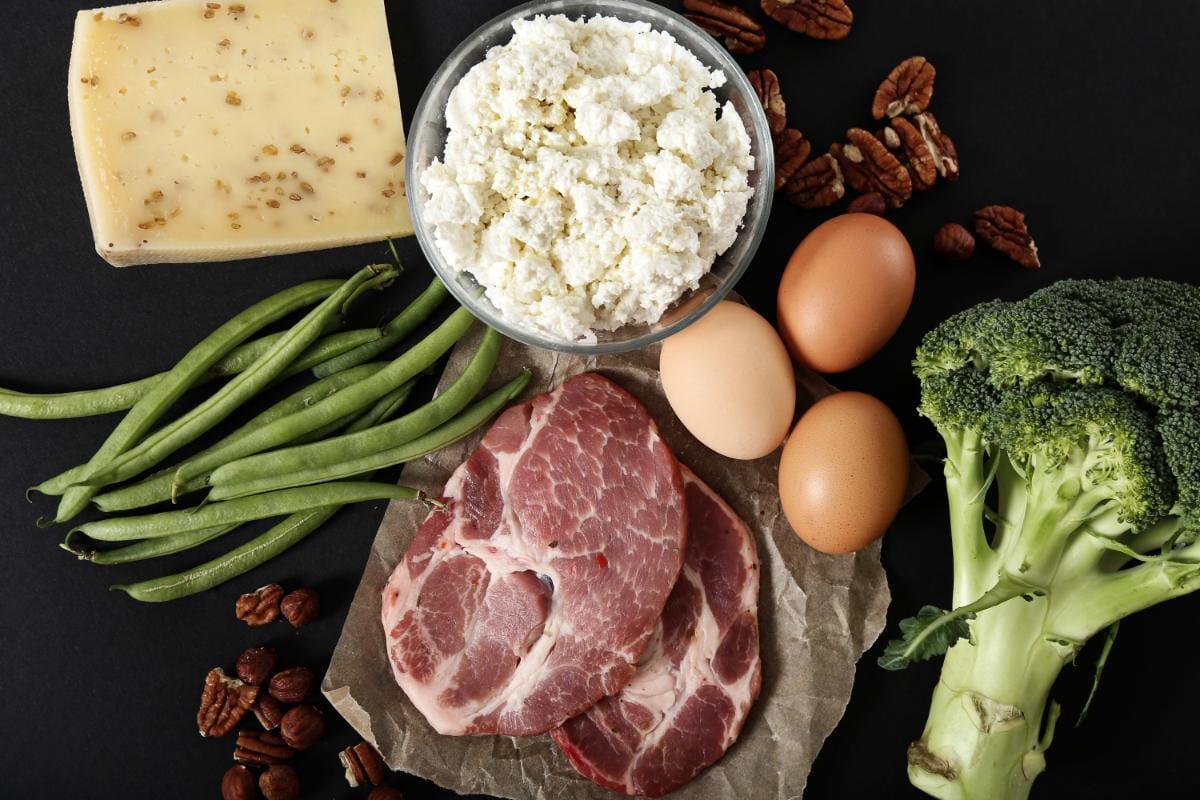- ThriveWire
- Posts
- 🌙 Sleep Your Way to a Longer Life
🌙 Sleep Your Way to a Longer Life
Quality rest to boost health, foods to protect your heart, and cutting-edge cell rejuvenation.
Welcome back to ThriveWire!
Hi ThriveWire readers!
As the holiday season picks up pace, we’re here to help you stay on top of your health and longevity game. This week, we’re diving into the science of better sleep, the surprising power of plant proteins, and the fascinating world of cellular rejuvenation.
Plus, we’ll explore cutting-edge insights from longevity thought leaders and highlight actionable tips you can easily incorporate into your routine.
Here’s what’s inside this week:
Here’s what’s inside:
🌙 The Role of Sleep in Healthspan: Why quality rest is a non-negotiable for a longer, healthier life, and how to improve your sleep hygiene.
🥦 Plant vs. Animal Protein: New research shows how choosing the right proteins can improve heart health and reduce chronic disease risk.
🧬 Dasatinib + Quercetin: A Cellular Rejuvenation Breakthrough: Explore the senolytic combination making waves in anti-aging science.
🤔 What Else Is Happening This Week?
Epigenetic Clocks: Cutting-edge aging indicators that reveal your biological age.
Longevity Hackers Documentary: A visionary film on the future of lifespan and healthspan extension.
Pro-Aging Metabolic Reprogramming (PAMRP): A groundbreaking theory on the metabolic shifts driving aging.
Move More to Live Longer: Why physical activity trumps age and chronic illness as a longevity predictor.
Peter Attia Talks Longevity: Insights from his in-depth interview at Google, packed with practical takeaways.
The Role of Sleep in Healthspan: Rest Your Way to Longevity 🌙

When it comes to living longer and healthier, sleep is often the unsung hero. Quality sleep is a cornerstone of healthspan, influencing everything from brain health to immune function and even life expectancy. Yet, in our fast-paced world, sleep often takes a back seat to other priorities.
Why Sleep Matters for Longevity
Research consistently highlights sleep as a critical determinant of healthspan. Poor sleep has been linked to increased risks of chronic conditions like cardiovascular disease, diabetes, and Alzheimer's. A lack of restorative sleep accelerates cellular aging and compromises the body's ability to repair and regenerate.
Key insights:
Brain health: Sleep clears toxins, including beta-amyloid, which is associated with Alzheimer's disease.
Immune support: A single night of inadequate sleep can reduce natural killer cell activity, leaving you more vulnerable to illness.
Metabolic regulation: Sleep influences hormones that regulate appetite, making chronic sleep deprivation a risk factor for obesity and diabetes.
Strategies for Better Sleep Hygiene
Achieving better sleep is within reach for most of us. Here are science-backed strategies to enhance your sleep hygiene and, by extension, your longevity:
Consistent Schedule: Go to bed and wake up at the same time every day, even on weekends.
Dark, Cool Bedroom: Aim for a room temperature of 60–67°F (15–20°C) and block out light with blackout curtains or a sleep mask.
Digital Detox: Avoid screens for at least an hour before bed to minimize blue light exposure, which disrupts melatonin production.
Wind-Down Routine: Incorporate relaxing activities such as reading, light stretching, or meditation.
Limit Stimulants: Avoid caffeine after 2 p.m. and minimize alcohol, which disrupts REM sleep.
Managing Sleep Disorders
If better sleep hygiene doesn’t resolve your sleep issues, consider these steps:
Sleep apnea screening: If you snore or wake up feeling tired, consult a healthcare provider about potential sleep apnea.
Cognitive Behavioral Therapy for Insomnia (CBT-I): Evidence-based therapy proven to improve chronic insomnia.
Professional evaluation: Persistent difficulties might warrant a sleep study to diagnose and address underlying issues.
A Must-Read Resource
For a deeper understanding of sleep's vital role in your health, I highly recommend Matthew Walker’s book, Why We Sleep. This comprehensive guide explores the science of sleep and offers actionable advice to improve both quantity and quality.
As a GP, I thought I had sleep advice all figured out, but this book opened my eyes to so much I didn’t know. Honestly, I was a little embarrassed I hadn’t read it sooner!
Whether you’re curious about how sleep impacts your healthspan or you’re searching for actionable steps to sleep better, Why We Sleep is a game-changer. It’s one of those rare books that can genuinely transform how you approach your health.
Sleep is Non-Negotiable
In the words of Matthew Walker, “Sleep is the single most effective thing we can do to reset our brain and body health each day.” Prioritizing sleep isn’t a luxury, it’s a necessity for living longer, healthier, and happier. Start making small changes today, and let the power of restorative sleep work its magic.
The Sleep App That Forbes Rated 5 Stars 😱
The app Forbes said helps "users achieve high-quality sleep by creating and maintaining effective sleep routines.” is back with new sounds and features!
Now featuring over 300 unique sounds to fall asleep to, a personalized sleep tracker and more. It’s no wonder over 65 million people have downloaded this app for better sleep.
Try it tonight 👇
Plant vs. Animal Protein: A New Chapter in Cardiovascular Health 🥦🍗

A recent study published in The American Journal of Clinical Nutrition sheds light on the connection between protein sources and cardiovascular health.
Spanning three decades and over 200,000 participants, the research compared the effects of plant and animal proteins on the risk of cardiovascular disease (CVD), coronary artery disease (CAD), and stroke. Here's what the evidence reveals:
Key Findings
Cardiovascular Benefits: Participants with a higher ratio of plant-to-animal protein (around 1:2 or greater) experienced a 19% lower risk of CVD and a 27% lower risk of CAD compared to those consuming more animal protein.
Stroke Risk: While the plant-to-animal protein ratio showed no significant association with stroke risk overall, substituting red and processed meat with plant proteins like nuts and whole grains reduced stroke risk.
Substitution Matters: Replacing just 3% of energy intake from animal protein with plant protein was linked to an 18% reduction in CVD risk and a 24% reduction in CAD risk. Nuts were particularly beneficial as a substitute.
Why This Matters
The study highlights that the type of protein you consume significantly impacts your cardiovascular health. Plant proteins are generally lower in saturated fats and higher in beneficial nutrients like fiber and unsaturated fats. They also reduce levels of compounds like trimethylamine N-oxide (TMAO), which is linked to heart disease.
Practical Tips for a Healthier Diet
Add More Plants: Incorporate more legumes, nuts, seeds, and whole grains into your meals.
Rethink Meat: Start small by swapping red or processed meat with plant-based proteins a few times a week.
Nutrient Focus: Ensure your plant-based protein choices are nutrient-dense. Opt for foods like beans and nuts over refined grains.
Mind the Ratio: Aim for a plant-to-animal protein ratio of at least 1:2 (around 0.5) to gain cardiovascular benefits, or higher for even greater protection against CAD.
This research reaffirms the growing consensus: shifting towards plant-based proteins can not only improve your health but also make a meaningful difference in reducing chronic disease risk. It’s another compelling reason to think about what's on your plate. 🌱
Dasatinib + Quercetin: A Dynamic Duo for Cellular Rejuvenation 🧬

What if clearing out “zombie cells” could slow aging and improve your health? Dasatinib, a cancer drug, and Quercetin, a plant compound found in apples and onions, have emerged as one of the most researched senolytic therapies.
Together, they work to eliminate senescent cells - damaged cells that linger in the body, driving inflammation and age-related diseases.
What the Research Shows 🔬
Broad Senolytic Action: Dasatinib excels at clearing senescent cells from fat tissue and blood vessels, while Quercetin targets cells in the lungs and other tissues. This combination provides a complementary, tissue-specific approach to cellular cleanup.
Healthspan Boost: Animal studies reveal significant benefits: reduced inflammation, improved organ function, and extended healthspan. Early human trials suggest potential for treating age-related conditions like osteoarthritis and pulmonary fibrosis.
Synergistic Mechanism: Dasatinib disables the survival pathways of senescent cells, while Quercetin triggers their apoptosis (self-destruction). Together, they amplify each other’s effects.
Intermittent Therapy: Unlike daily drugs, this combination is typically taken in short, periodic bursts. Common protocols involve a few doses every couple of months, minimizing side effects while maximizing impact.
Clinical Supervision Required: Dasatinib is a prescription medication with potential side effects like fatigue and nausea. Quercetin is generally safe, but supplementation should be monitored, particularly at high doses.
Practical Tip for Beginners 🛠️
If you're curious about natural senolytic strategies, start by including Quercetin-rich foods like apples, onions, and capers in your meals. For those considering supplements or Dasatinib, consultation with a healthcare provider is essential.
Why It Matters ❤️
Senescent cells are a root cause of chronic diseases and accelerated aging. Removing them offers an innovative approach to enhancing healthspan and tackling age-related conditions. While further research is needed, the Dasatinib + Quercetin combination represents a significant leap toward targeted therapies that could revolutionize healthy aging.
By taking a proactive approach to cellular health today, you may be paving the way for a longer, more vibrant tomorrow.
What Else is Happening This Week? 🤔
Epigenetic clocks as aging indicators: This study explores how epigenetic clocks reflect biological age.
"Longevity Hackers" Documentary: Explore the cutting-edge science and bold visions of extending human healthspan and lifespan, featuring top experts and balanced perspectives on the future of longevity.
Pro-Aging Metabolic Reprogramming (PAMRP): This new theory suggests aging is driven by degenerative shifts in metabolism that may be reversible with targeted interventions.
Move More to Live Longer: Physical activity is the strongest predictor of longevity, more impactful than age or chronic disease.
Peter Attia on Longevity: Talks at Google: Long-form interview featuring actionable advice on extending lifespan and healthspan from Dr. Peter Attia.
Thanks for reading this week’s ThriveWire! 💡
As we look toward the close of another year, it’s a great time to reflect on how we can optimize our health and make the most of the years ahead. Whether it’s improving your sleep, making smarter dietary choices, or embracing the latest breakthroughs in longevity science, every step counts.
Got a favorite tip or a topic you’d like us to cover? Let me know! I’d love to hear from you. And if ThriveWire brought value to your week, don’t keep it to yourself. Share it with someone who might need a little extra inspiration.
Stay inspired, stay informed, and remember: small, consistent changes can lead to extraordinary outcomes.
"The secret of getting ahead is getting started." – Mark Twain
Stay healthy,
Andrew Courtney
Founder, ThriveWire
Where to Find the Best Deals on Hoka Shoes
Meaning “to fly” in Maori, Hoka was founded in 2009 so that anyone spending long hours on their feet could get the ultimate experience with optimum cushioning and stability. Less than 15 years after its founding, Hoka is bringing in revenues topping a billion dollars a year, so it’s clear that people are loving this brand. But with quality comes high prices, and Hoka is no doubt in the high end price-wise. Thanks to Brad's Deals, we found the best prices on Hoka.
How did we do with todays Newsletter?Your feedback helps us make ThriveWire better. |
Disclaimer: The information provided in ThriveWire is for educational purposes only and is not a substitute for professional medical advice, diagnosis, or treatment. Always consult your healthcare provider before making changes to your diet, exercise routine, or health regimen.


